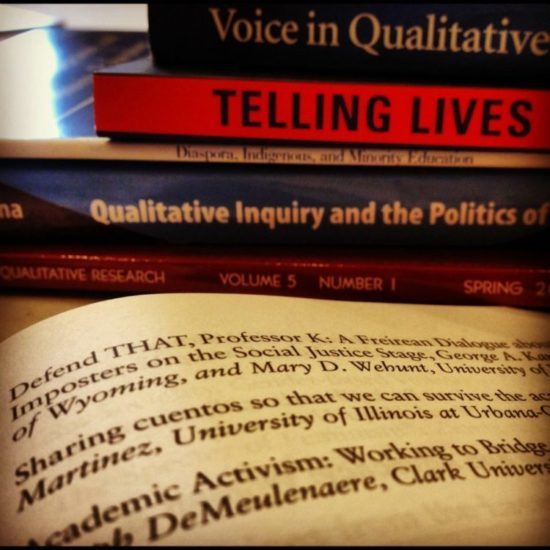It wasn’t always easy for me to come back home. I was the first in my family to attend college at age 17, and I was also the eldest child and a girl in a traditional Mexican household. Coming home was not easy after the first semester because I was not the same girl who left home that summer after graduating high school. Clearly this is expected as when young people go to college because they begin to learn new ideas, concepts, and gain some sort of freedom. As a young mujer, daughter and an immigrant as well, these changes were different from the experiences of some of my classmates. Through high school, I was in class with predominantly Latino students, and in college it was the complete opposite. Being one of the only Mexican-American students in college made me more ethnic. I became more Mexican, but I also became more American or ‘white’ as my mom used to say. I wanted to eat salads and pasta instead of beans and tortillas. It hurt my mother that I did not want to eat our food, though I never intended to offend her. What I deemed exciting and new, my mother saw as a rejection to what she knew. On the other hand, my peers in college found it fascinating that I would use Spanish words without trying to Americanize them or that I would wear huipiles to class (yes, before they were popular). I was not like most of my classmates.
Something that I was not prepared for as a young college student was the change in my relationship with my family. During the semester, I would come home every other weekend, and it was usually for a day or two max. However, for winter break I would spend six weeks before I could go back to the dorm. During the long break, I realized that I was not the same person, and there were a lot of challenges ahead. There were so many things that I would find problematic at home, from not being able to sit around and watch the novela with my mom or having to do the dishes simply because I was the girl, along with not being able to go out late, and speaking out more often. Things that when I used to do in high school were once part of the norm, both because I was young, the eldest and had to be responsible for my sibling and also because my parents held more traditional views on gender role responsibilities. Adding to this, I was an hija educada and had to show respeto to my parents and their home.
Going away to graduate school to pursue my master’s degree and then my doctorate degree again heightened these changes in ways I somehow felt unable to verbalize. Coming home after my first semester in my doctoral program, I began to not be able to enjoy anything including shows that I used to watch, the same would go for when I hung out with friends, even those that I graduated college with. The academy changes you, you first are left voiceless and eventually you will recuperate your voice, but in the meantime what do you do? This is some advice I give my students, especially my young Latina students who are coming back from graduate school after their first semester: “You are loved, even though it can be hard for our parents to verbalize it.” Often parents do not understand that sometimes you are not done with doing work, i.e. papers, writing, conference proposals, etc. We must remind them that school is our job, that our job is not just to go to class and write a paper and then not engage with our books or readings, but that we are constantly having to think as we are working through new ideas even if we aren’t actively reading or writing.
Share your new knowledge with your family and listen to what they have to say. We might be amazed at how much they will help us make sense of these new theories because in some ways they have the lived experience. This goes for your friends as well. Do not be surprised that some friends, even those that you went to college with won’t understand where you are coming from because you see things differently now, usually a bit more critically. However, to agree to disagree is key unless these disagreements attack your humanity, then it might be time to let go. Most importantly, enjoy being home. Believe it or not, home is different, it has changed, and it will be unclear in what ways at the beginning of your educational journey. So, enjoy the beauty of home, family, friends and your community because they feed and fill your soul because those relationships matter as you make it through another step in the academy.
Mariana Martinez
Latest posts by Mariana Martinez (see all)
- Conozca a Omar Medina, Candidato a Miembro de la Junta Escolar de la Ciudad de Santa Rosa para el Área 4 - October 2, 2018
- Meet Omar Medina, Candidate for Santa Rosa City School Board Trustee for Area 4 - September 26, 2018
- Perfil de Luchadora: Conozca a Ariana Aparicio, Estudiante DACA y Dirigida a Harvard - August 28, 2018
- Luchadora Profile: Meet Ariana Aparacio, DACAmented and Headed to Harvard - August 24, 2018
- La Estudiante de Sonoma State Patricia Ayala Macías, Comparte Por Qué es Importante Que Los Estudiantes Universitarios Participen en el Gobierno Estudiantil - April 6, 2018

